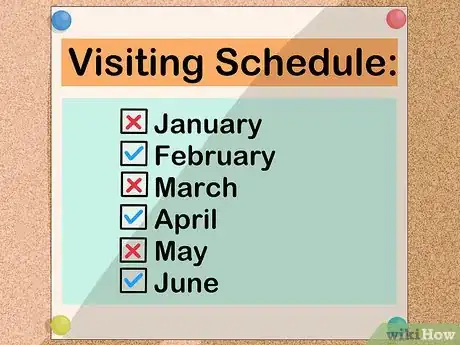This article was co-authored by Michelle Shahbazyan, MS, MA. Michelle Shahbazyan is the Founder of The LA Life Coach, a concierge life, family, and career coaching service based in Los Angeles, California. She has over 10 years of experience with life coaching, consulting, motivational speaking, and matchmaking. She has a BA in Applied Psychology and an MS in Building Construction and Technology Management from Georgia Tech University, and a MA in Psychology with an emphasis on Marriage and Family Therapy from Phillips Graduate University.
This article has been viewed 29,484 times.
In-laws can be a point of tension in any relationship. They probably do things differently than your family, and often have expectations that you will do things their way. Likewise, you may be expecting them to operate in the same way your family does. Both sides might easily forget or overlook these expectations from day to day, but when your in-laws visit, things can get awkward. You can make the best of the situation by planning the visit in advance, striving to have a good time while they are there, and evaluating the visit to improve future visits.
Steps
Planning the Visit
-
1Discuss the visit with your spouse. For a successful visit, you and your spouse must be on the same page. As the visit is being planned, discuss all of the arrangements with your spouse. Also, talk about which aspects of your life your in-laws are and are not welcome to be involved.
-
2Make accommodations. If your in-laws live far away, they are going to need a place to sleep. Make space in a spare bedroom, or turn another room into a temporary bedroom. If you’d prefer your in-laws stay somewhere else, help point them in the direction of comfortable, reasonably priced lodging.
- To ease the tension of suggesting lodging, offer to pay for some or all of it if your finances allow.
Advertisement -
3Set boundaries. You and your spouse need to agree ahead of time what involvement the in-laws can have in your daily life. Consider boundaries on things such as child rearing, housekeeping, and family decisions. Come to an arrangement that works for both of you and leaves you feeling comfortable and at ease with the impending visit.[1]
- For example, it might be unacceptable for your in-laws to feed the kids junk food before dinner. Make this boundary known.
-
4Create escape times. If you know you’ll need a break from the visit, plan to do some tasks during the visit. You can arrange to run errands, take important calls, or attend a class or meeting during the visit. Be careful not to overdo it, though. Staying away for the entire visit would likely be seen as rude.
- Plan ahead with your spouse so that you each get a break from the pressure of entertaining your in-laws. You should each know when the breaks are planned to occur and what the other spouse plans to do with your in-laws.
-
5Find entertainment for your in-laws. Instead of giving yourself a break, you can also consider giving your in-laws a break. Book local entertainment for them, or recommend a great restaurant. This will give you some space from the visit, and be seen as a kind gesture by your in-laws.
Managing the Visit
-
1Maintain your boundaries. Whatever boundaries you set, you have to maintain them during the visit. It is generally best if your spouse addresses the boundaries with your in-laws when possible. This will show that you are both on the same page.[2]
- For example, if your in-laws try to feed your kids candy before dinner, your spouse could step in and say something like, “The kids need to eat their dinner first, but they can have sweets after. That’s our rule.”
-
2Communicate directly with your in-laws.[3] When your spouse isn’t available to address boundaries, you should step in and maintain your boundaries. You should also make conversation with your in-laws directly and not leave it up to your spouse to do all of the entertaining. This will help build a relationship between you and your in-laws and make future visits less awkward.[4]
- For example, if one of your in-laws says something that you find offensive, you could address it by saying something like, “Please don’t say things like that around me. You are entitled to your opinion, but hearing you say such things bothers me.”
-
3Keep your family’s routine. Keeping a routine helps everyone. However, this is especially important if you have kids because you need to maintain the sense of normalcy. Make sure that everyone is still going to work, school, and extracurricular activities during the visit. This will make the visit more enjoyable, and make it easier to return to normal life once the visit is over.
-
4Include your in-laws. Keeping to a normal schedule doesn’t mean that you have to exclude your in-laws. Let them come along to extracurricular activities with the kids. You could even enlist their help to drop off or pick up kids from school and/or babysit in the evenings. They will enjoy getting to spend time being involved with their family, and you may get a break, as well.
-
5Take some ‘me time’ when needed. You are not obligated to entertain your guests around the clock. If you need to unwind, you can take a walk or go to bed early. Just politely excuse yourself and take the space you need.
Dealing with Problems
-
1Let small things slide. There will likely be points of tension between you and your in-laws. When this happens, make a conscious effort to decide whether it is worth holding your ground, or letting it slide.[5] If the offense is not a big deal, don’t mention it. Your in-laws will leave and things will go back to normal soon.[6]
- For example, letting the kids sit up late on a weekend and play board games with their grandparents is probably excusable.
-
2Stand your ground. If you feel strongly that something needs addressed, you should address it. When your in-laws cross your boundaries, letting it slide will only make things worse. This gives the impression that your rules do not apply to your in-laws or in their presence.[7]
- For example, if an in-law undermines your parenting, you need to address it immediately to avoid it happening again. You could say something like, “I make the rules for my children, and they will abide by them. That holds true when we have company, too.”
- If your in-laws are around frequently, you might need to address things more often than if they only come around a time or two per year.
-
3Avoid unrealistic expectations. Your spouse’s family likely did things differently than your own. Holidays, traditions, and day to day life might look very different for your in-laws.[8] Allow them the space to be themselves and avoid putting the pressure on for them to conform to your way of life.[9]
- Try to see things from their point-of-view. Just as you'd be upset if they forced you to change your holidays and traditions, it's unfair for you to be overly strict and try to force them to do things your way.
Getting Back to Normal
-
1Evaluate the visit. Once the visit is done, talk it through with your spouse. Discuss what things went well, and what things might need to be changed in the future. Try to keep a positive tone during the conversation so that your spouse isn’t too uncomfortable.
-
2Consider making adjustments as needed. Your in-laws may bring up important points while they are visiting. If anything is said that makes you rethink the way you do things on a daily basis, talk to your spouse about adjusting your routine. If the visit didn’t go so well, talk to your spouse about how to improve the next visit.
- For example, if your housing in-laws caused a great deal of tension, you could suggest that next time they visit you pay for a hotel room.
- There is always room for improvement, so consider each visit a learning experience. Consider your mistakes and try to plan ways to avoid them on the next visit.
-
3Wait at least a month before having company again. Give your family time to resettle before you have company over again. This includes the in-laws that just left. Once everyone is back on schedule and settled down again, you can consider inviting more company.
Expert Q&A
Did you know you can get expert answers for this article?
Unlock expert answers by supporting wikiHow
-
QuestionHow can I stop myself from getting frustrated with my in-laws?
 Michelle Shahbazyan, MS, MAMichelle Shahbazyan is the Founder of The LA Life Coach, a concierge life, family, and career coaching service based in Los Angeles, California. She has over 10 years of experience with life coaching, consulting, motivational speaking, and matchmaking. She has a BA in Applied Psychology and an MS in Building Construction and Technology Management from Georgia Tech University, and a MA in Psychology with an emphasis on Marriage and Family Therapy from Phillips Graduate University.
Michelle Shahbazyan, MS, MAMichelle Shahbazyan is the Founder of The LA Life Coach, a concierge life, family, and career coaching service based in Los Angeles, California. She has over 10 years of experience with life coaching, consulting, motivational speaking, and matchmaking. She has a BA in Applied Psychology and an MS in Building Construction and Technology Management from Georgia Tech University, and a MA in Psychology with an emphasis on Marriage and Family Therapy from Phillips Graduate University.
Matchmaker, The LA Life Coach Keep your mind and body calm when interacting with them. If you are getting flustered at any time, look inwards and ask yourself if you are being logical or if something has triggered you. When people push our buttons, if we value the relationship with them, they are really just forcing us to be the best version of ourselves.
Keep your mind and body calm when interacting with them. If you are getting flustered at any time, look inwards and ask yourself if you are being logical or if something has triggered you. When people push our buttons, if we value the relationship with them, they are really just forcing us to be the best version of ourselves. -
QuestionHow do you deal with difficult family during the holidays?
 Michelle Shahbazyan, MS, MAMichelle Shahbazyan is the Founder of The LA Life Coach, a concierge life, family, and career coaching service based in Los Angeles, California. She has over 10 years of experience with life coaching, consulting, motivational speaking, and matchmaking. She has a BA in Applied Psychology and an MS in Building Construction and Technology Management from Georgia Tech University, and a MA in Psychology with an emphasis on Marriage and Family Therapy from Phillips Graduate University.
Michelle Shahbazyan, MS, MAMichelle Shahbazyan is the Founder of The LA Life Coach, a concierge life, family, and career coaching service based in Los Angeles, California. She has over 10 years of experience with life coaching, consulting, motivational speaking, and matchmaking. She has a BA in Applied Psychology and an MS in Building Construction and Technology Management from Georgia Tech University, and a MA in Psychology with an emphasis on Marriage and Family Therapy from Phillips Graduate University.
Matchmaker, The LA Life Coach Holidays can be a time of conflict, but you don't have to let them. Focus on finding compromises between what everyone wants. Chances are, family members have a different vision about how the holidays will go and may even have different traditions they want to keep alive. Talk to each other and try to incorporate something for everyone.
Holidays can be a time of conflict, but you don't have to let them. Focus on finding compromises between what everyone wants. Chances are, family members have a different vision about how the holidays will go and may even have different traditions they want to keep alive. Talk to each other and try to incorporate something for everyone.
References
- ↑ http://www.parenting.com/article/making-peace-with-your-in-laws
- ↑ https://www.familyeducation.com/life/dealing-laws/ten-basic-rules-dealing-laws
- ↑ Michelle Shahbazyan, MS, MA. Life Coach. Expert Interview. 18 March 2020.
- ↑ https://www.familyeducation.com/life/dealing-laws/ten-basic-rules-dealing-laws
- ↑ Michelle Shahbazyan, MS, MA. Life Coach. Expert Interview. 18 March 2020.
- ↑ http://www.parenting.com/article/making-peace-with-your-in-laws
- ↑ http://www.parenting.com/article/making-peace-with-your-in-laws
- ↑ Michelle Shahbazyan, MS, MA. Life Coach. Expert Interview. 18 March 2020.
- ↑ https://www.familyeducation.com/life/dealing-laws/ten-basic-rules-dealing-laws











































































